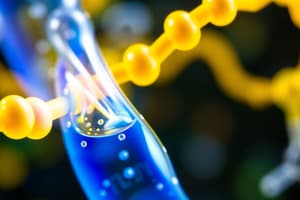Podcast
Questions and Answers
What is the primary focus of chemical kinetic reaction?
What is the primary focus of chemical kinetic reaction?
- The equilibrium constant of a reaction
- The rate of a chemical reaction (correct)
- The yield of a reaction
- The feasibility of a reaction
What are the two aspects of studying a chemical reaction?
What are the two aspects of studying a chemical reaction?
- Equilibrium and kinetics
- Thermodynamics and stoichiometry
- Kinetics and catalysis
- Thermodynamics and kinetics (correct)
What is the unit of measurement for the rate of a chemical reaction?
What is the unit of measurement for the rate of a chemical reaction?
- Moles per second
- Moles per liter per second (correct)
- Liters per mole per second
- None of the above
What is the term for the speed or velocity of a chemical reaction?
What is the term for the speed or velocity of a chemical reaction?
What is the symbol commonly used to represent the rate of a chemical reaction?
What is the symbol commonly used to represent the rate of a chemical reaction?
What is the significance of ΔGͦ = 0?
What is the significance of ΔGͦ = 0?
What is the relationship between Keq and the concentrations of A and B at equilibrium?
What is the relationship between Keq and the concentrations of A and B at equilibrium?
What is the pH at which the reaction takes place at equilibrium?
What is the pH at which the reaction takes place at equilibrium?
What is the significance of constant temperature in the reaction?
What is the significance of constant temperature in the reaction?
What is the characteristic of the reaction at equilibrium?
What is the characteristic of the reaction at equilibrium?
What is a characteristic of an enzyme-catalyzed reaction?
What is a characteristic of an enzyme-catalyzed reaction?
What is true about the substrate in an enzyme-catalyzed reaction?
What is true about the substrate in an enzyme-catalyzed reaction?
What is the key difference between an enzyme-catalyzed reaction and a non-enzyme-catalyzed reaction?
What is the key difference between an enzyme-catalyzed reaction and a non-enzyme-catalyzed reaction?
What is the role of an enzyme in a reversible reaction?
What is the role of an enzyme in a reversible reaction?
What is a consequence of an enzyme-catalyzed reaction being reversible?
What is a consequence of an enzyme-catalyzed reaction being reversible?
What is the equilibrium constant designated as under certain conditions?
What is the equilibrium constant designated as under certain conditions?
Which type of reaction has a ΔGͦ value less than 0?
Which type of reaction has a ΔGͦ value less than 0?
In an equilibrium reaction, what is the relationship between the rate of formation of products and reactants?
In an equilibrium reaction, what is the relationship between the rate of formation of products and reactants?
What is the role of enzymes in a chemical reaction?
What is the role of enzymes in a chemical reaction?
What type of reaction is characterized by a ΔGͦ value greater than 0?
What type of reaction is characterized by a ΔGͦ value greater than 0?
What is a characteristic of reversible reactions?
What is a characteristic of reversible reactions?
What is the role of enzymes in chemical reactions?
What is the role of enzymes in chemical reactions?
What is the effect of enzymes on the equilibrium of a chemical reaction?
What is the effect of enzymes on the equilibrium of a chemical reaction?
How do enzymes affect the rate of a chemical reaction?
How do enzymes affect the rate of a chemical reaction?
What is the relationship between enzymes and the attainment of equilibrium?
What is the relationship between enzymes and the attainment of equilibrium?
What is the effect of enzymes on the forward and backward reactions?
What is the effect of enzymes on the forward and backward reactions?
Flashcards are hidden until you start studying
Study Notes
Chemical Reactions and Enzymes
- A chemical reaction is studied in two aspects: thermodynamics and kinetics.
- Chemical kinetic reaction is the study of the rate (velocity) of a chemical reaction, represented by V values.
Reversible Reactions and Enzymes
- Enzymes can easily turn a product into a substrate and vice versa, making the reaction reversible.
- In a reversible reaction, ΔG˚ = 0.
- At equilibrium, the reaction takes place at constant temperature and pH (pH 7), and Keq = [B]/[A].
Equilibrium Constants
- The equilibrium constant under constant temperature and pH conditions is designated K'eq.
- There are three types of reactions based on ΔG˚:
- Exergonic reactions: ΔG˚ < 0, products have lower energy than substrates, spontaneous, and release energy.
- Endergonic reactions: ΔG˚ > 0, products have higher energy than substrates, non-spontaneous, and require energy.
- Equilibrium reactions: ΔG˚ = 0, equilibrium in the energy of reactants and products, no release or requirement of energy.
Importance of Enzymatic Chemical Reactions
- Enzymes do not alter the direction of the chemical equilibrium of the reaction.
- Enzymes catalyze the forward and backward reactions equally and do not alter the equilibrium itself.
- Enzymes accelerate the attainment of equilibrium.
Studying That Suits You
Use AI to generate personalized quizzes and flashcards to suit your learning preferences.



